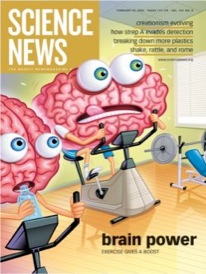

  |
|
Economist:
Cognition
Nutrition: Food for Thought
Jul
17th 2008, From The
Economist
print edition
CHILDREN have a lot to contend with these days, not
least a tendency for their pushy parents to force-feed them omega-3 oils
at every opportunity. These are supposed to make children brainier, so
they are being added to everything from bread, milk and pasta to baby
formula and vitamin tablets. But omega-3 is just the tip of the
nutritional iceberg; many nutrients have proven cognitive effects, and do
so throughout a persons life, not merely when he is a
child. |
|
|
OPEN How
to Get Smart. Really
... ??I??m lucky that I love fish,??says Dr.
Fernando Gomez Pinilla over the phone, and that??s no frivolous foodie
confession from this professor of neurosurgery and physiological science
at the University of California, Los Angeles (UCLA). He is talking about
his latest scientific research which happens to have spilled onto his
dinner plate. It shows that a fish-n-fruit-rich diet can improve brain
function, protect the mind and stave off mental ageing. ??The brain, more
than any other organ in the body, consumes a tremendous amount of energy.
It??s also subjected to a lot of oxidative stress which results in cell
damage,??he says. ??Fish, berries and antioxidants reduce and reverse
this. They also protect the learning and memory nerve
membranes.??Docosahexaeonoic acid (DHA), an Omega-3 fatty acid that makes
up about 30 per cent of our nerve cell membranes, is also found in oily
fish like salmon and sardines, while its vegetarian version linolenic acid
is present in walnuts and flax seeds. Tanking up on these fats improve
memory and learning. ... |
|
|
Der Spiegel D??nger
f??rs Gehirn
By J?rg Blech | 20 December 2008
A German based, international magazine.
... ??In Los Angeles schlie?lich widmet sich der
Neurobiologe Fernando G??mez-Pinilla an der University of California dem
Ph?nomen. "Die Nahrung wirkt auf das Gehirn wie ein Arzneimittel", erkl?rt
der geb??rtige Chilene, dessen Forschung sich vor allem um
Omega-3-Fetts?uren dreht. ?? |
|
|
UCLA Newsroom: Scientists
learn how food affects brain
In addition to helping protect us from heart
disease and cancer, a balanced diet and regular exercise can also protect
the brain and ward off mental disorders.
"Food is like a pharmaceutical compound that
affects the brain," said Fernando Gomez-Pinilla, a UCLA professor of
neurosurgery and physiological science who has spent years studying the
effects of food, exercise and sleep on the brain. "Diet, exercise and
sleep have the potential to alter our brain health and mental function.
This raises the exciting possibility that changes in diet are a viable
strategy for enhancing cognitive abilities, protecting the brain from
damage and counteracting the effects of aging."
Gomez-Pinilla analyzed more than 160 studies about
food's affect on the brain; the results of his analysis appear in the July
issue of the journal Nature Reviews Neuroscience and are available online
at Nature. |
|
|
Newsweek: Health
for Life: Can Exercise Make You Smarter?
... With regular exercise, the body builds up its
levels of BDNF, and the brain's nerve cells start to branch out, join
together and communicate with each other in new ways. This is the process
that underlies learning: every change in the junctions between brain cells
signifies a new fact or skill that's been picked up and stowed away for
future use. BDNF makes that process possible. Brains with more of it have
a greater capacity for knowledge. On the other hand, says UCLA
neuroscientist Fernando Gomez-Pinilla, a brain that's low on BDNF
shuts itself off to new information. In his experiments,
... |
 |
|
Los Angeles Times: Health:
Nutrition: Remember this: Benefits of gingko are minor
By
Chris Woolston, Los Angeles Times Jun 18, 2007
... Ginkgo may be the most scrutinized supplement
to ever hit health store shelves. There have been hundreds of ginkgo
studies, including many classic rats-in-a-maze-type investigations and
dozens of human trials. According to Fernando Gomez-Pinilla, a professor
of neurosurgery at UCLA and a spokesperson for the Society for
Neuroscience, the bulk of these studies point in the same direction:
Ginkgo probably can help improve thinking, but not by much. "It won't make
you a genius," he says. ... |
|
 |